The Treatment of Depression with Chinese Medicine
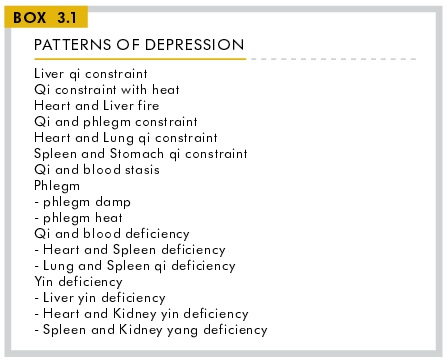
Depression describes a group of disorders characterized by sadness, despondency, rumination, inability to experience pleasure, and feelings of hopelessness and inadequacy that are severe or persistent enough to interfere with normal function, interest in life and family and social interaction. Depressed patients experience a range of symptoms in addition to the mood component, and it is helpful to think of depression as a disorder that interferes with the basic aspects of life: the energy for activity, appetite, sex drive and sleep.
Typical symptoms of depression include reduced sex drive, decreased appetite and weight loss (although increased appetite and weight gain can occur), constant fatigue, poor concentration, withdrawal from social situations and activities, and thoughts of death or suicide. Sleep disturbance, insomnia, waking in the early hours of the morning, or somnolence are common. Patients may report headaches, vague aches and pains and digestive problems. Symptoms can vary during the day but are usually worse upon waking in the morning.
True depression should be distinguished from the low mood that results from disappointment or loss, which may be better described as demoralization (From the Merck Manual 18th Ed.). The negative feelings of demoralization, unlike those of depression, usually abate when circumstances improve; the duration of the low mood lasts days rather than weeks or months, and suicidal ideation and loss of function are less likely.
Patients with depressed mood can be classified into two groups: those with low mood as a response to specific circumstances, and those in which no specific trigger can be identified. These distinctions are clinically important, because if a cause can be identified, the probability of a satisfactory outcome is increased. Demoralization as a result of distressing or stressful stimuli can be a normal and appropriate response to the circumstances and will abate with time. In some cases, the response to the distressing event may be exaggerated, pathological, and indistinguishable from major depression (see next page). In both cases, Chinese medicine, in conjunction with counseling, lifestyle modification, and other appropriate interventions, can be of significant benefit, helping the patient to move through the process, while supporting healthy organ system function and maintaining qi and blood flow.
Depression without an identifiable cause is a more complex condition. It will usually be diagnosed as major depression, with the pathology a mix of constitutional factors, life habits and diet, and an exaggerated response to chronic stress, routine difficulties and setbacks. This type of depression can be difficult to manage effectively with a single therapeutic strategy, and may require a multifactorial approach, especially when suicide is a possibility. Practitioners should not be reluctant to harness the relatively fast acting pharmacotherapeutic approach of psychiatry, with the awareness building of cognitive behavioral therapy, and the supportive, strengthening and qi and blood mobilizing effects of Chinese medicine. From a psychiatric point of view, there are three groups of depression; minor, major and masked. The Diagnostic and Statistical Manual, 4th edition (DSM-IV) lays out the standard diagnostic criteria (Box 3.2).
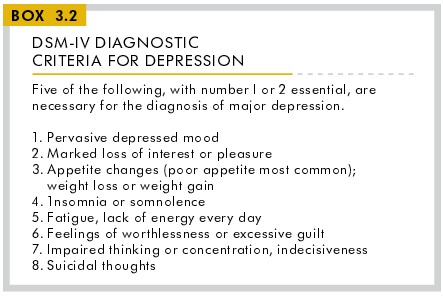
Minor Depression
Minor depression is a mood disturbance of at least 2 weeks’ duration, with two to four of the DSM-IV criteria (Box 3.2), including number 1 or 2. There are no delusions, and suicidal thoughts, if present, are fleeting and not seriously entertained. Minor depression is usually a form of demoralization (described above).
Major Depression
Major depression is a disabling condition which adversely affects all aspects of the patient’s life, and is characterized by the presence of a severely depressed state that persists for at least two weeks. The diagnostic criteria for major depression are shown in Box 3.2. Episodes may be isolated or recurrent, and occur without identifiable trigger events. Patients with major depression may contemplate and attempt suicide, and occasionally suffer delusions or hallucinations.
Masked Depression
Masked depression is a depressed state characterized by the prominence of physical symptoms. Patients may not complain of depression, or may deny it. They usually present with multiple minor physical complaints. The mood component is hidden beneath tiredness, menstrual disorders, unusual sensations in the head and body, breathing difficulties and sleep problems. Masked depression is relatively common, and is influenced by cultural factors and perceptions of depression as a sign of weakness and social stigma.
DEPRESSION IN CHINESE MEDICINE
Mental and physical health is a product of the quality, volume and uninhibited movement of qi and blood. All mental disorders are due to disruption of one or more of the internal organ systems and their mental components, the shen, hun, po, yi and zhi (henceforth collectively known as the anima (from the Latin meaning mind or soul)), by insufficient or constrained qi and blood.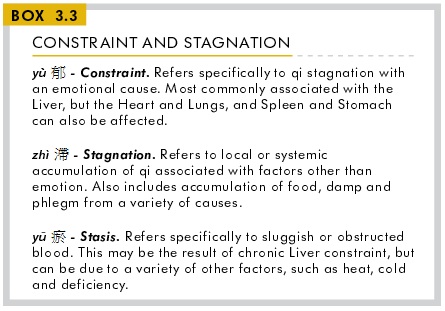
In Chinese, depression is ‘yù zheng’ 郁 证. In the context of medicine, the word yù 郁 conveys the meaning of a restraining action on the flow of qi, which we render as constraint. Qi flow through the surface layers can be constrained by the 'freezing and constricting' nature of cold. Qi flow can also be constrained in various organ systems by repression of emotion. The term constraint is used to distinguish it from other forms of stagnation due to factors not related to emotion (Box 3.3). In the context of depression, constraint is most commonly applied to the effect of emotional repression on the Liver, but can also apply to the Heart and Lungs, and Spleen and Stomach. Different emotions cause constraint in different organs, with different expressions of the depressed mood.
Constraint of qi, however, is not the only cause of a depressed mood. Even though the term yù 郁 implies that constraint of some type is at work in depression, this is not always the case. Both deficiency and excess factors can influence the anima and produce depression. Constraint interferes with the expression and activity of the anima by restricting their movement, which in turn produces a particular shade of mood disorder. The anima can also be destabilized and scattered by a deficiency of qi, blood, yin and yang, with a different tone to the depressed state.
Characteristics and pathology of the anima
SHÉN 神
The shen resides in the Heart and is anchored by Heart yin and blood. It is responsible for all mental activity, perception, conscious awareness and the ability to feel. All perceptions and emotions are recognized and felt in the Heart. The shen perceives, but does not direct perception to action or reflection. The shen relies on input from the other anima to turn perception into action; the hun for insight, direction and intuition, the po for sense perception, the zhi for the drive to act upon perception and the yi to learn from experience.
Qi constraint, blood stasis and phlegm restrict the shen and prevent its expression. Blood and yin deficiency leave the shen unanchored and destabilized. Heat can irritate the shen, prevent it from resting and cause sleep disturbances. A constrained shen results in depression, lack of clarity in thinking, diminished insight and poor judgement. An unanchored shen is unstable, easily flustered and prone to anxiety, panic attacks and confusion. The shen is active while awake, but may be disturbed during sleep, causing vivid dreams and insomnia.
HÚN 魂
The hun is the mental aspect of the Liver and is anchored by Liver yin and blood. The hun is associated with creativity, artistic endeavor, intuition, the unconscious, the making of plans and the courage to follow them through. A healthy, well-grounded hun enables forward planning with creativity, vision and insight. The hun is active in dreams, and is the creative impulse drawn upon when a problem is solved after 'sleeping on it'. When the hun and shen are balanced, wisdom is the result; when unbalanced the person may have many dreams but never accomplish anything.
A constrained hun leads to depression with a lack of inspiration and direction, diminished creativity and loss of insight. Patients feel themselves hemmed in by insurmountable barriers. A heated or overly stimulated hun results in manic or irrational behavior. A destabilized hun, ungrounded by deficiency of blood or yin, leads to aimlessness, lack of courage and resolve, indecisiveness and sleep walking.
PÒ 魄
The po is the mental aspect of the Lungs and is grounded by Lung qi. The po is concerned with awareness of sensation on the skin and perception through the five senses. It is the point of contact between the body and the external environment and helps create a sense of self. A healthy po enables strong contact and engagement with the world, and establishes clear boundaries between self and others.
Weak Lung qi destabilizes and scatters the po, leading to depression and withdrawal, to a sense of raw exposure and vulnerability, extreme sensitivity to the emotions, thoughts and presence of others, and a sense of disconnection, isolation and separation from the world and society. In extreme cases, the patient feels completely adrift, as if they are not really there, and they could simply dissipate.
A constrained po leads to depression with a sense of constant sadness and a tendency to weeping.
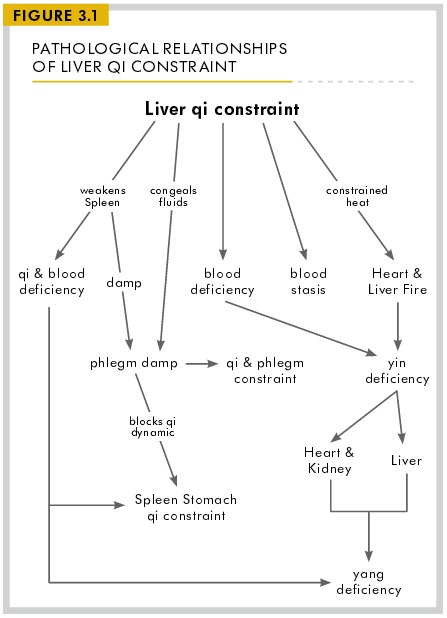
YÌ 意
The yi is the mental aspect of the Spleen and is responsible for application of mental activity to specific tasks, and for the ability to concentrate and keep the awareness (shen) focused. The yi is called into action when studying, reading, learning and meditating. Yi is also brought to bear when thinking through a problem.
A yi that is constrained by brooding or worry leads to depression and melancholic brooding, with obsessive thinking and an inability to concentrate constructively. Patients are unable to let go of thoughts and turn the same ones over and over. When the yi is destabilized by weak Spleen qi, patients cannot concentrate, quickly lose interest and are unable to stay focused on simple tasks. There is a tendency to overeat or comfort eat, and patients may obsess about food.
ZHÌ 志
The zhi is the mental aspect of the Kidneys and is associated with memory, motivation, ambition, the willpower and determination to act, stability in the face of adversity and change, and an orienting sense of family connection and history.
Pathology of the zhi is always associated with deficiency of yin and/or yang. Deficiency of yin leads to a lack of grounding and a destabilized zhi; weak yang causes the zhi to 'freeze' in place. Instability or freezing of the zhi results in depression with despair and despondency, fearfulness, lack of drive and will to change, sexual withdrawal and loss of libido.
PATHOLOGY
Depression can be divided into two types, excess and deficient. The excess types are due to the effects of qi constraint, or stagnation of a pathogen such as phlegm damp or blood, on the anima. The deficient types are due to a lack of qi, blood, yin or yang, and the destabilizing effects of deficiency. The effects of constraint and deficiency produce different types of mental symptoms. Constraint in general produces a gloomy despondency, as the free expression and movement of the animus in question is restricted. The effects of deficiency produce a depression that is an amalgamation of gloominess and anxiety, as the unanchored anima are easily scattered and thrown off balance.
Constraint of qi is more common in younger people and in those with depression of relatively recent onset. The more chronic the depression, the more likelihood of significant deficiency, with elements of constraint or stasis secondary. Acute onset of depression can occasionally be of a deficient type. This is seen in women following childbirth where blood loss has led to blood deficiency. Deficiency will gradually complicate chronic qi constraint, as the Spleen and Kidneys become progressively weaker, constrained heat damages yin, and lack of interest in food and reduced appetite leads to an inadequate diet and relative malnutrition.
The excess and deficient types of depression can appear superficially similar, but there are differences in the tone of the depression as noted above, and physical signs which can distinguish them. In general, depression due to constraint of qi, phlegm accumulation and/or blood stasis, reflect the pent up state of qi. The patient may appear quiet and withdrawn, but there is muscle tension and spasm, elevated shoulders, aches and pains and tension headaches. The deficiency patterns on the other hand, are due to a lack of vital energy, so the patient feels flat, exhausted and washed out. The muscles are flaccid, weak and toneless, and the posture slumped. In practice, patients who present to the Chinese medicine clinic often have multiple patterns. Combined patterns are usually linked by predictable pathological relationships (Fig. 3.1).
ETIOLOGY
Emotional factors
Emotional turmoil of some type is assumed to be at least partly responsible for all depression (with the exception of depression following hemorrhage). Some patients will report a specific history that has led them to the state they are in. The traumatic events may be severe or ongoing, or their coping and recovery mechanisms may be compromised by a constitutional or acquired tendency. Others deny trauma or stress, and appear to be in supportive family and work situations. In such patients an emotional or physical trauma is assumed, but may have occurred decades before, become lost in the general run of life, or was seemingly trivial and was brushed off at the time. At some point, the combination of constitutional predisposition, and other non emotional contributing factors, merge and tip the patient over into depression.
Specific emotions can influence certain organ systems preferentially. Anger, rage and related emotions like resentment, frustration and bitterness cause Liver qi to become constrained when they are repressed, extreme, prolonged or unprocessed. Repression of these emotions is perhaps the most common cause of constrained qi, and some of the commonest presentations of depression can be seen as rage turned inwards.
Grief and sadness are the normal and appropriate response to bereavement and loss, but when extreme, protracted or ultimately unresolved, they can both constrain and deplete Heart and Lung qi.
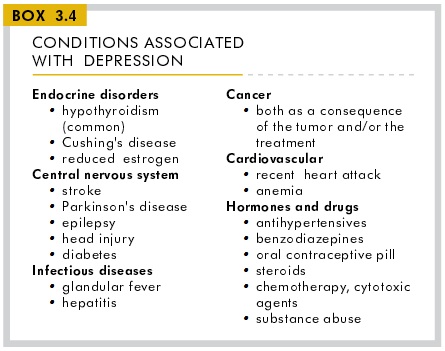
Excessive or irrational worry can contribute to both constraint and deficiency. Worry can cause Spleen qi to knot, leading to obstruction of the qi dynamic and depletion of Spleen qi. This in turn gives rise to damp and phlegm, which further congest qi movement.
The Kidneys can be depleted by a severe or sudden shock or fright, and by prolonged fearfulness. The Kidney/Heart axis can also be disrupted by sudden physical or emotional shock, leading to a loss of communication between the Heart and Kidneys, and disruption to the relationship between the shen and zhi. This most commonly gives rise to depression accompanied by anxiety and insomnia, and is a factor in the depression that accompanies post-traumatic stress disorder.
Constitution
Many patients with depression have a family history. A predisposition to depression may pass through the Heart and Kidneys (shaoyin), the Liver, Spleen, and Lungs, or as a tendency to phlegm accumulation. When the Heart and Kidneys are weak, depression occurs early in life, usually during late childhood or adolescence. A congenital weakness of Heart qi can lead to an anxious disposition, whereas weakness of the Kidneys leads to fearfulness, timidity and phobia, which may present as withdrawal. Weakness of the Lungs contributes to a tendency to be disengaged from the world and to feelings of isolation and separation. Congenital weakness of the Spleen can lead to a tendency to excessive worry and a tendency to suppress this by overeating, compounding phlegm damp accumulation. A phlegm constitution is usually apparent from a relatively early age, with a tendency to weight problems, concentration difficulties and lack of energy. Conversely, an inherited Spleen deficiency can lead to anorexia and a persistent refusal to eat, or an obsessive or rigid attitude to food, resulting in depletion of qi and blood and a thin body.
Sleep cycle
Insufficient sleep, or a sleep cycle that is out of synchrony with the internal rhythms of the individual, is a contributing factor to the development of both qi stagnation and deficiency of yin and blood. This is seen in people who do shift work, air crew who frequently cross time zones and those who habitually stay up late into the night and sleep well into the day.
Activity levels
The increasingly sedentary work practices and leisure activities of the industrial world are a significant contributor to the rising levels of qi and blood stagnation. Regular physical activity and exercise have been shown to have a major positive impact on depression.
Depletion, overwork, exhaustion
Working excessively long hours, or laboring to the point of exhaustion, can deplete Spleen and Kidney yang qi. Any activity that excessively taxes the Spleen will lead to qi and blood deficiency, and the creation of phlegm damp.
A sudden blood loss, or increase in the demands placed upon the blood, can contribute to depression. This is seen in some cases of post-natal depression, where hemorrhage, breast feeding, inadequate rest and poor replacement of blood converge.
Diet
The diet plays a minor role in most cases of depression, but there are some cases in which diet is influential. Diets that are inadequate in some way, especially those that are too cold or raw or lacking in protein can lead to yang qi and blood deficiency. A diet rich in phlegm generating foods, sugar, fizzy drinks, carbohydrates, fats and dairy can aggravate a tendency to phlegm accumulation.
The diet becomes more influential once depression has occurred, as inattention to the diet and poor nutrition from lack of interest in food can lead to qi and blood deficiency, dampness and phlegm, which complicate the initial pathology.
TREATMENT
Successful treatment of depression requires a multifactorial approach. A regular regime of herbs and acupuncture is only one part of a comprehensive treatment plan. A combination of Chinese medical intervention, some form of psychotherapy, appropriate exercise and changes in routine lead to a better outcome than any single intervention. Acupuncture is most effective when the primary pathology is constraint of qi. With deficiency, herbs are usually required to supplement it.
There are two potential stumbling blocks which must be overcome if treatment is to succeed. The first is the nature of the illness itself, characterized as it is by a sense of hopelessness and despair. Depressed patients, as part of their pathology, can easily become disenchanted and give up treatment before it has had a chance to start working. The second problem is that real results take time to become firmly established. The challenge for the practitioner is to keep the momentum of treatment going long enough for the patient to see the benefits accruing. An ideal treatment plan involves a combination of acupuncture, herbal medicine, dietary adjustment and ongoing reinforcement, support and education, given in treatment blocks of 10-15 sessions, at twice weekly or weekly intervals. The repeated contact is an essential part of the strategy, and provides an opportunity to manage and reinforce positive habits, exercise levels and dietary changes.
Exercise
Regular exercise, especially aerobic exercise, is an important part of treatment. From a Chinese medicine point of view, exercise mobilizes qi and blood and disperses constrained qi, and is beneficial for those whose pattern includes stagnation as a significant component. A daily brisk walk of the type outlined below is an ideal way to get the qi moving and maintain its flow, but every other day will accrue significant benefit. The results of regular aerobic activity are cumulative and when a certain level of cardiovascular fitness is attained, the qi tends to be less prone to constraint, and situations that may have precipitated an episode of qi constraint and depression are tolerated better.
The most beneficial form of exercise to move qi and blood is moderate in intensity, but sustained and aerobic. The aim of the exercise is to get the heart rate up to about 50% above the resting heart rate and keep it at that level for 30-60 minutes. For example if the resting heart rate is 80 beats per minute (BPM), the target rate during exercise is 120 BPM. The person should be breathing deeply but not gasping for breath.
Yoga, taijiquan, qigong
Many patients find some form of exercise that involves mental concentration helps their mood. Yoga, taijiquan and qigong are forms of physical and mental training, involving exercises aimed at improving qi flow and the ability of the mind to maintain a point of concentration. They require a reasonable degree of effort to initiate and maintain, and may not always be the best solution for patients in the early stages of treatment, but for long term mental and emotional stability they are excellent skills to cultivate, with definite benefits on mood and other physiological parameters. A teacher is vital, and doing these sort of exercises in a group is a crucial factor in enhancing their mood elevating effects, and the encouragement to keep going. These forms of activity are more appropriate than aerobic exercise for frail or debilitated people.
Cognitive behavioral therapy (CBT)
Many people benefit from exploring and expressing their feelings in an appropriate setting. As one of the main etiological features of depression is the repression or internalization of emotion, its expression and resolution in a safe environment can hasten recovery. Many studies have shown that therapies such as cognitive behavior therapy are effective for depression. Clinical experience suggests that the combination of acupuncture and Chinese medicine in conjunction with CBT to be even more effective.
Hot spot therapy
Hot spot therapy can be helpful for some types of depression.
Getting out of bed earlier
Many depressed patients sleep too much and at inappropriate times. Getting into bed early and rising with the sun has a beneficial effect on some depressed patients.
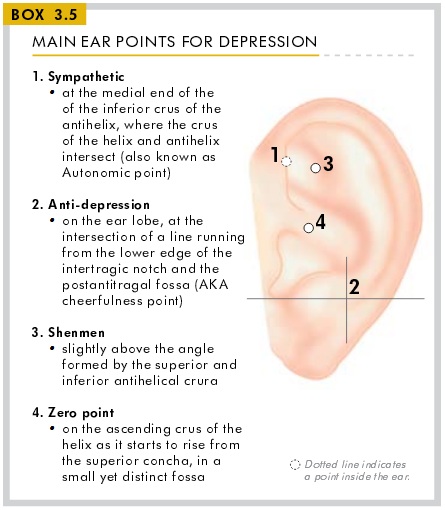
Ear acupuncture
Ear acupuncture is a useful addition to any treatment regime. Ear points can be left in situ for several days and provide additional support between acupuncture treatment sessions. In addition to the points selected on the basis of the organs involved, there are specific points that are especially useful for depression (Box 3.5). The best points to use are those that test positive with a point locating device.
Antidepressant medications
Many patients presenting with depression will be, or will have been, medicated with antidepressant medication. Patients present to the Chinese medicine clinic because they feel the medications are becoming less effective, they are experiencing side effects, are concerned about the long term effects, or are not happy with the sedation or flattening of the emotions that antidepressants sometimes cause. The action of pharmaceutical antidepressants is similar to the pungent warm qi moving herbs that are used to alleviate qi constraint and phlegm damp patterns. Their pungent warmth disperses not only constrained qi and phlegm damp but also the patient's normal qi, and introduces heat into the body. When used for long periods or in high doses, qi and yin may be damaged, accounting for the common side effects of dryness and thirst. The same applies to pungent warm dispersing herbs, and similar cautions should be exercised.
The fact that pharmaceutical antidepressants mimic the action of pungent warm dispersing herbs also accounts for their relatively modest effectiveness. Various studies suggest that 35-50% of depressed patients achieve satisfactory relief with antidepressant medication. Those who fail to respond or react badly to antidepressant medications would likely be diagnosed by Chinese medicine with deficiency or mixed deficiency and excess patterns of depression for which pungent warm dispersal is contraindicated.
Managing patients taking antidepressants
The aim of Chinese medicine treatment is to relieve depression by gradually improving physiological function and the movement of qi and blood. As function improves the need for antidepressant medications should decrease, and they can be carefully withdrawn. When antidepressant medications are reduced, it should be done gradually so as to reduce the likelihood of reflex depression. When herbs are prescribed for patients already taking some form of antidepressant medication, their initial response should be carefully monitored, as qi mobilizing formulae combined with antidepressant medications can have an additive effect and increase, at least in the short term, the chance of adverse effects, such as increased heat and dryness. There are a few herbs that can help alleviate these unwanted effects to an extent, while at the same time relieving constraint and lifting the mood. In patients on multiple medications, rather than prescribing more medicine, it may better to start with acupuncture, administered as frequently as possible.
Please see William Maclean’s chapter on Depression in his Clinical Handbook of Internal Medicine, Vol. 3, Qi, Blood, Fluid, Channels, for extensive information on over 10 commonly differentiated Chinese medical diagnoses, including the etiology, clinical features, treatment principles, and acupuncture and herbal prescriptions.


